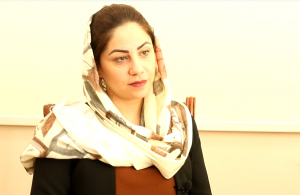Social Context for Taliban Ideology

Talking to CSHRN, Homaira Qaderi, Afghan people suffered from deprivation under the Taliban regime in the 1990s. With the new political establishment in 2001, a new horizon was opened to the people to attend schools and universities; however, as a result of discriminatory policies, educational institutions became politicized. Many people were deprived of education consequently.
CSHRN: How will the peace agreement positively affect the situation?
Homaira: As long as the law is not enforced and citizens are not respected, I don’t think if the peace deal can help the situation for the better. Peace is not just the absence of war; it is also about peace of mind. Part of the current security deterioration is due to poverty and economic crisis.
CSHRN: How do you assess the progress in peace talks?
Homaira: As women have always been sidelined in Afghanistan, women are now present in the peace negotiations despite a disproportionate number. This brings hope to Afghan people and their military forces who have suffered a lot. And yet, my main concern is that each side of the negotiation will attempt to use the peace talks as a springboard to advance their personal interests. The government has the responsibility to hold and raise the public’s messages and concerns. Peacebuilding takes time and the Taliban must embrace peace because they are also citizens of this country.
CSHRN: How do you evaluate the capacity of women representatives to defend women’s rights?
Homaira: There are concerns about their capacity and integrity in protecting women’s rights. For example, some of the members might represent only the government rather than the Afghan population as a whole. However, it is time to maintain our solidarity.
CSRHN: What do you mean by representing the government?
Homaira: Those members holding government positions will undoubtedly be aligned with the government. Otherwise, they will lose their jobs if they act independently.
CSHRN: Given the Taliban’s approach to women, will peace dialogue with the group be successful?
Homaira: Unfortunately, war, explosions, and bombings have hit hard Afghanistan and the country has been introduced by these tragedies for several decades. The Taliban hold harsh attitudes towards women and it has not changed much. Unless the international community supports Afghanistan, the country will not be able to protect women’s rights during the peace talks.
CSHRN: What women’s rights must be prioritized not to be compromised in peace talks?
Homaira: I think gender equality must be taken into serious consideration in the peace talks with the Taliban. Meaning that men and women must be able to enjoy their equal rights before the law in the post-peace situation.
CSHRN: Will the government agree if the Taliban attempt to restrict women’s rights?
Homaira: The government has no right to compromise women’s rights. The government can only represent me when it is committed to protecting my rights. Afghan women and rights have changed so much. Therefore, the peace deal must fulfill their requirements.
CSHRN: In case of any peace deal, what do you think of public trials and the burning of female schools?
Homaira: In some parts where the Taliban are not active, the community is still opposed to girl’s education. When families can behead their daughters, setting the school on fire is a simple task for them. Not only the Taliban but some families are also doing the same thing. In most areas, the community imposes such restrictions on their daughters in which Taliban are not involved. Over the past two decades, the government did not much support the Ministry of Information and Culture or the Ministry of Education to bring changes in the public mindset towards girls and women. For example, Farkhunda was publically stoned not by the Taliban but by the common people in the middle of the city.
CSHRN: How can women representatives and female journalists affect the Taliban?
Homaira: They can impact the Taliban’s views of women. Yet, the Taliban will still try to maintain their harsh attitudes. For example, one women representative mentioned how she was ignored by the Taliban during the peace talks in Doha.
Ms. Homaira argued that the peace talks must by any means protect women’s rights. Otherwise, the outcome will not be acceptable.